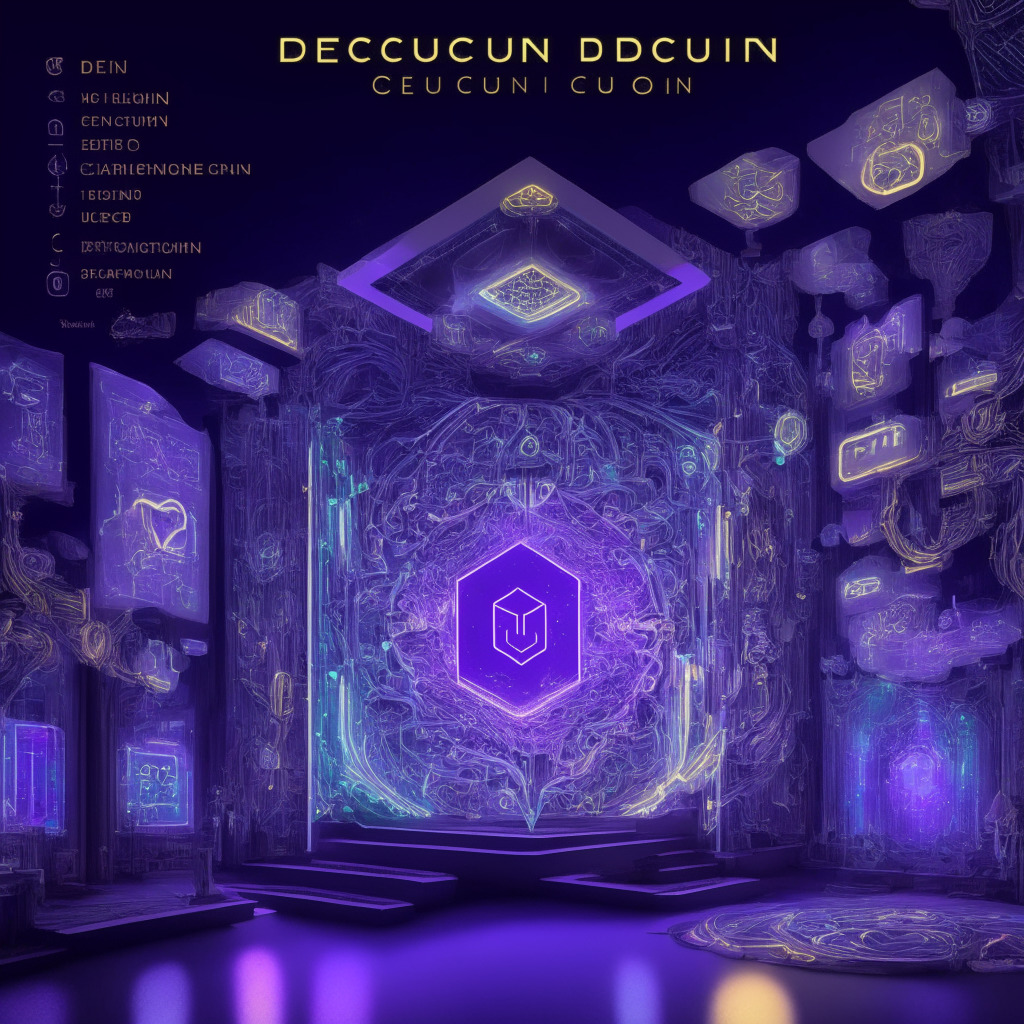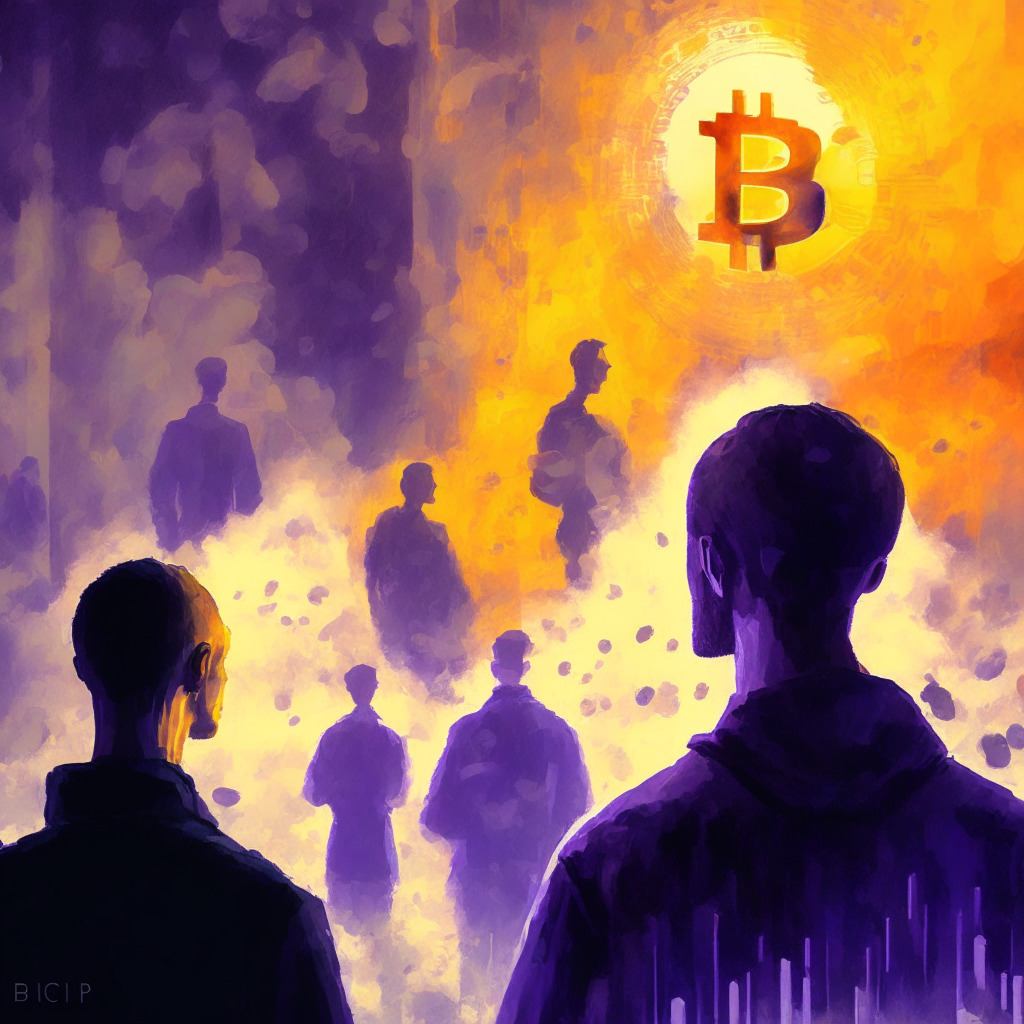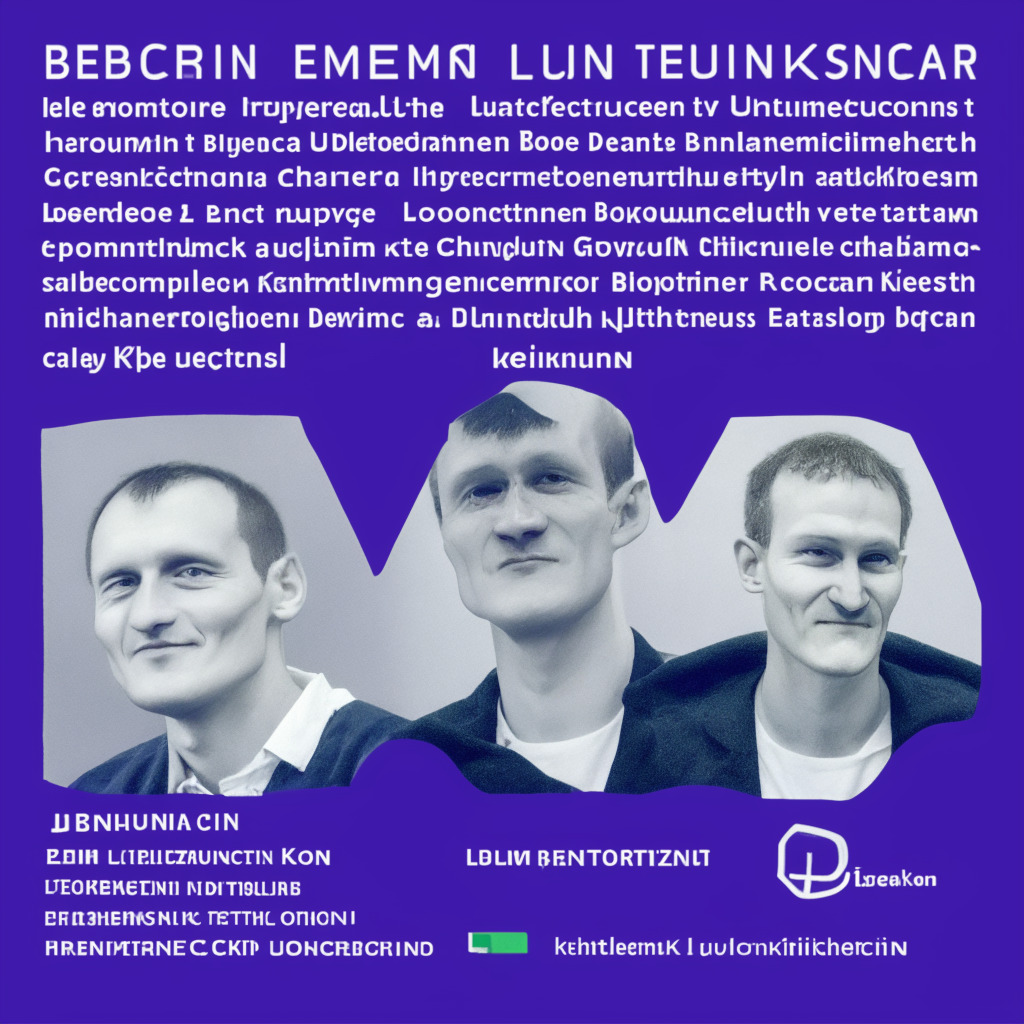“Zero-knowledge rollup ZKM from the MetisDAO Foundation envisions transforming Ethereum into the universal settlement layer for all applications. This hybrid rollup could increase transaction throughput and reduce costs. Besides, ZKM plans to extend its infrastructure to non-blockchain domains including AI and IoT.”
Search Results for: Ethereum Foundation
Ethereum Co-founder’s Connection to Prometheum: Overzealous Scrutiny or Valid Concern?
The connection between Ethereum co-founder Vitalik Buterin and Wanxiang Blockchain Labs has re-entered the spotlight due to Prometheum, a firm partly owned by Shanghai Wanxiang Blockchain and praised by SEC Chairman Gary Gensler for regulatory compliance. This connection raises questions about the intricate relationships between crypto companies and their founders, impacting the industry’s push for regulatory acceptance.
Ethereum’s Market Resilience: Long-Term Growth Amid Crypto Volatility and Regulations
Ethereum (ETH) experienced a slight decline of 0.60% to $1,741.24, extending losses over the past week. Despite short-term downturn, Ethereum remains attractive for long-term success with a market capitalization of $209.26 billion and a YTD increase of 43.96%. Amidst market turbulence, 59.66% of Ethereum addresses are in profit, showcasing resilience against regulatory challenges.
Ethereum Plunges 6.5% – Uncertain Future vs Hopeful Indicators: Exploring Pros, Cons, and Alternatives
Despite Ethereum’s recent 6.5% drop to $1,637, its fundamentals remain robust with a possible price recovery forthcoming. With its successful staking withdrawals, deflationary tendencies, and favorable market positioning, Ethereum holds promise for recovery, while emerging altcoins such as ecoterra offer fresh opportunities for investors.
SEC’s Contradictory Stance: Impact on Ethereum, Altcoins, and Crypto Market Recovery
In 2018, SEC Chair Gary Gensler stated that Ethereum and Bitcoin are not securities. Recently, Gensler declared all cryptocurrencies except Bitcoin as securities, launching enforcement initiatives within the cryptosphere. As lawsuits develop, investors must continuously adjust their crypto portfolios and observe market trends to navigate the ever-evolving landscape.
Ethereum’s Dencun Upgrade: Pros, Cons, and the Future of Blockchain Scaling
The upcoming Dencun upgrade to the Ethereum network in late 2023 promises significant improvements, including increased data storage, reduced fees, and blockchain scaling. The upgrade involves several Ethereum Improvement Proposals, like EIP-4844 (proto-danksharding), EIP-1153, EIP-4788, and EIP-6780, addressing various aspects of blockchain technology. Despite potential risks, these enhancements highlight the constant evolution and expansion of possibilities within the blockchain realm.
Ethereum Optimism’s Bedrock Upgrade: Boon or Bane for Blockchain’s Future?
Ethereum’s Optimism layer 2 scaling solution completes its Bedrock upgrade, reducing deposit-confirmation times to 1 minute and lowering gas fees by 40%. The upgrade aims to improve performance and cost-effectiveness, but potential compatibility and stability issues within the multi-client ecosystem warrant cautious optimism.
Ethereum Co-Founder’s Massive $41M ETH Sale: Impact on Price and Market Speculation
Ethereum co-founder Jeffrey Wilcke transferred 22,000 ETH ($41.13 million) to Kraken, fueling speculation of a significant ETH price drop. This follows previous large-scale ETH sales by the Ethereum Foundation and co-founder Vitalik Buterin, creating uncertainty in the crypto community.
Layer 2 Summer 2024: Ethereum’s Booming Future or Baseless Hype?
Ethereum enthusiast Anthony Sassano predicts a “Layer 2 summer” in the crypto market by next year, driven by technical advancements, reduced fees, and innovative projects. The anticipated improvements aim to make Layer 2 solutions more affordable and accessible, potentially attracting millions of new participants to the Ethereum ecosystem. However, the excitement comes with skepticism as potential risks and challenges tied to the technology persist.
Cryptocurrency Rollercoaster: Bitcoin’s Struggle, Ethereum’s Rise, and the Digital Euro Debate
In May, Bitcoin climbed to $28,000 but struggles to maintain momentum, while Ether experienced a modest increase. The ECB finalized digital euro prototypes, but remains skeptical about Web3-style DLT and smart contracts. Prosecutors validated charges against former FTX head Sam Bankman-Fried. Recent Bitcoin surge enabled 1.4 million addresses to accumulate 700,000 bitcoins, suggesting crucial support.
Ethereum Breakout Signals Potential Trend Reversal: Analyzing Market Conditions & Resistance Levels
Ethereum recently experienced a price breakout on May 28th, signaling a potential trend reversal. With a high volume of buyers, Ethereum’s market value could climb 12.2% to hit $2132. However, investors must vigilantly observe market conditions as resistance levels remain crucial to maximize success in the volatile market.
Ethereum’s Bedrock Hard Fork: Optimism’s Game Changer or Arbitrum’s Continued Dominance?
The Ethereum blockchain will undergo the Bedrock hard fork on June 6 as Optimism, a layer 2 scaling solution, introduces a major upgrade for improved modularity, simplicity, and Ethereum equivalence. This is expected to increase performance and functionality, while fueling positive market sentiment for Optimism’s Layer 2 network.
Ethereum’s Beacon Chain Finality Issues: Lessons Learned & Network Resilience
Ethereum core developers quickly addressed Beacon Chain finality issues by rolling out patches for Prysm Labs and Teku clients. High load on Consensus Layer clients caused the problem which affected transaction finalization. Upgrades released by Teku and Prysm help prevent excessive resource usage and mitigate future issues. Continuous improvement and diverse ecosystem of clients are crucial for blockchain technology’s resilience.
Ethereum’s Double Troubles: Resilience vs. Reliability Debate in Blockchain’s Future
The Ethereum network recently faced two performance issues within 24 hours that temporarily halted block finalization. Though the network recovered, concerns about its reliability resurface, potentially affecting market confidence and Ethereum’s role in the $27 billion total value locked across various financial infrastructures and applications.
EigenLayer: The Future of Blockchain Security or Overhyped Ethereum Competitor?
EigenLayer protocol aims to provide blockchain security-as-a-service, enabling secure crypto project launches without extensive funds, hardware, or validators. By “rehypothecating” staked ETH, it increases yield for stakers and incentivizes participation, while attracting praise and financial support from prominent investors. The project’s success, however, remains to be seen.
Ethereum’s Network Outages: How Growing Pains Affect Blockchain Security and Adoption
The Ethereum blockchain experienced two technical outages within 24 hours, causing concerns about network stability and security among users. These incidents raised valid questions regarding the platform’s ability to handle its growing adoption while maintaining consistent and secure performance.
Lido V2 Upgrade: Anticipating Benefits, Risks, and Impact on Ethereum Staking Demand
The upcoming Lido V2 upgrade, contingent upon an on-chain vote, will introduce benefits such as withdrawals for ETH and a staking router simplifying the crypto on-ramp for users. Offering streamlined validator exits and withdrawal requests fulfillment, the upgrade seeks to enhance users’ staking experience while addressing issues related to security and efficiency.
Ethereum’s Dencun Upgrade: Scaling the Blockchain and Reducing Fees vs. Potential Risks
Ethereum developers are planning the next significant blockchain transformation, “Dencun,” combining “Cancun” and “Deneb” upgrades. At its core lies EIP 4844, addressing increased storage capacity and reduced fees for layer 2 rollups. The Dencun upgrade, with potential benefits and drawbacks, aims to launch in the latter half of 2023, marking a critical juncture for the blockchain industry.
Ethereum Struggles at $2,000: Analyzing Futures, Memecoin Frenzy, and Fed Impact
Ether recently surpassed $2,000 but retreated back to its familiar range between $1,820 and $1,950. Despite the memecoin frenzy increasing Ethereum network demand, investors’ confidence remained low. Weak derivatives indicators may become more bearish if the sideways movement breaks to the downside.
Ethereum Creator’s Wallet Activity Sparks Market Speculation: Impact and Concerns
A wallet linked to Ethereum co-founder Vitalik Buterin transferred 3,500 ETH worth $6.56 million, sparking rumors of a possible sell-off. No official confirmation exists, and the impact of such a move remains uncertain. It’s crucial for investors to conduct thorough research before investing in the rapidly evolving cryptocurrency landscape.
Ethereum Defies Crypto Market Trends, PEPE Frenzy Impacts Gas Fees: Opportunity or Warning?
Ethereum (ETH) sees a 3.56% price increase, possibly breaking the $2,000 mark, as active deposits on the Ethereum blockchain hit a 1.5-year high. The PEPE memecoin frenzy drives Ethereum’s daily median gas fee to a 12-month high, showcasing its ability to decouple from the crypto market. Be cautious; Vitalik Buterin and Ethereum Foundation offloaded 15,000 ETH, potentially indicating a sell-off.
Ethereum, Ripple, Cardano, Pepe, and Tron: Analyzing Key Price Levels and Market Volatility
Ethereum seeks retest of $2,000 level while Ripple faces key support at 43 cents. Cardano forms bearish pattern with key support at 38 cents. Meme coin Pepe surges, but caution advised. Tron’s price increases by 6.3% as momentum indicators turn positive. Market conditions remain fluid; thorough research and caution essential for investments.
Ethereum’s Divergent Co-Founders: Lubin vs Buterin in Shaping the Future of Finance
Ethereum co-founders Joe Lubin and Vitalik Buterin took differing paths, with Lubin focusing on commercial aspects through ConsenSys while Buterin led a more idealistic nonprofit approach. As Ethereum development evolved, Lubin envisions it as a potential trust foundation supporting global financial infrastructure, but acknowledges challenges and rearchitecting global economy will take time.
Ethereum Attestation Service: Boosting Trust in Optimism’s Ecosystem & Potential Drawbacks
Ethereum-based layer-2 blockchain Optimism has integrated Ethereum Attestation Service (EAS) to enable users to assess trustworthiness on the platform. The on-chain attestation protocol promotes fairer distribution of Optimism’s native OP tokens and community voting systems. EAS has potential applications in identity platforms, supply chains, reputation scoring in DeFi, and promoting transparency in the Optimism ecosystem.
Gemini Foundation’s Global Expansion: Innovation vs Regulatory Challenges in Crypto Derivatives
Gemini recently launched the Gemini Foundation, a platform offering non-US derivatives to clients in 29 countries, highlighting a growing trend of crypto companies seeking favorable regulatory environments offshore. However, clients from the US, UK, and EU remain excluded, raising concerns about global crypto regulations and market fairness.
Crypto Correction or Opportunity? Examining Volatility, Presale Prospects and Market Risks
“Key market players Bitcoin and Ether witnessed a slump possibly due to inflation fears inspired by the Israel/Palestine conflict affecting oil producers. Amidst this, Ethereum Foundation’s substantial ETH token sale stirred the market. With rising uncertainty towards blue chip cryptocurrencies, crypto presale projects are emerging as high-risk-high-reward strategies attracting early investors.”
Rethinking Blockchain Terminology: From ‘Data Availability’ to ‘Data Publishing’ – A Paradigm Shift?
Understanding blockchain terminology like ‘data availability’ can be complex. Dankrad Feist from the Ethereum Foundation suggests a shift in name to ‘data publishing’ to simplify the concept. This opens a discussion on terminologies’ balance between simplicity and accuracy.
Ether’s Struggle: Meme Coins, Scalability Issues, and the Future of ETH
Ether experiences a slight increase to $1,870, attributed to the US Consumer Price Index inflation data. However, Ethereum faces scalability issues due to rising transaction fees amid high demand for meme coin transfers. The Ethereum Foundation plans to implement upgrades like “danksharding” to address these challenges, while longer-term technicals for ETH remain promising.
Repercussions of the Macroeconomic Landscape on the Cryptocurrency Sphere: Risks and Opportunities
The escalating situation between Israel and Palestine has impacted crypto values, with Ether and Bitcoin experiencing significant declines. An anticipated shift of attention towards economic indicators could further affect these values. Concerns about these risks have led traders towards minor digital currencies and meme coins, albeit extremely risky endeavors. Crypto remains a high-risk asset, and investors must remember the potential for loss.
Revolutionizing Crypto Trading: A Call for Enhanced Regulation and Standards in the Crypto-sphere
The World Federation of Exchanges (WFE) suggests stronger regulation to boost the credibility and safety of crypto-asset trading platforms (CTPs). However, concerns linger as practices like CTPs trading against their customers exist. Interestingly, the WFE is inclined towards embedding transparency through regulation, hence flagging the need for standards and regulation in the crypto markets.
Unmasking Filecoin: Blockchain Sleuths, Dubious Activities, and Investor Deception
Investigator @BoringSleuth’s report pointed out inconsistencies in the source of blockchain initiative, Filecoin’s ICO. It suggests a potential scheme intended to deceive investors by mimicking widespread investor interest. The verity of these claims remains unproven but they have raised important questions regarding transparency in the crypto realm.
Cryptocurrency Coders in Legal Crosshairs: Who is Accountable for Blockchain Misuse?
“Roman Storm and Roman Semenov, coders of the Tornado Cash protocol, face U.S. legal proceedings, accused of aiding North Korea’s Lazarus Group with money laundering. This indictment raises questions on developer accountability, regulation standards, and the balance between potential national security risks and the right to financial independence and privacy in blockchain technology.”






























